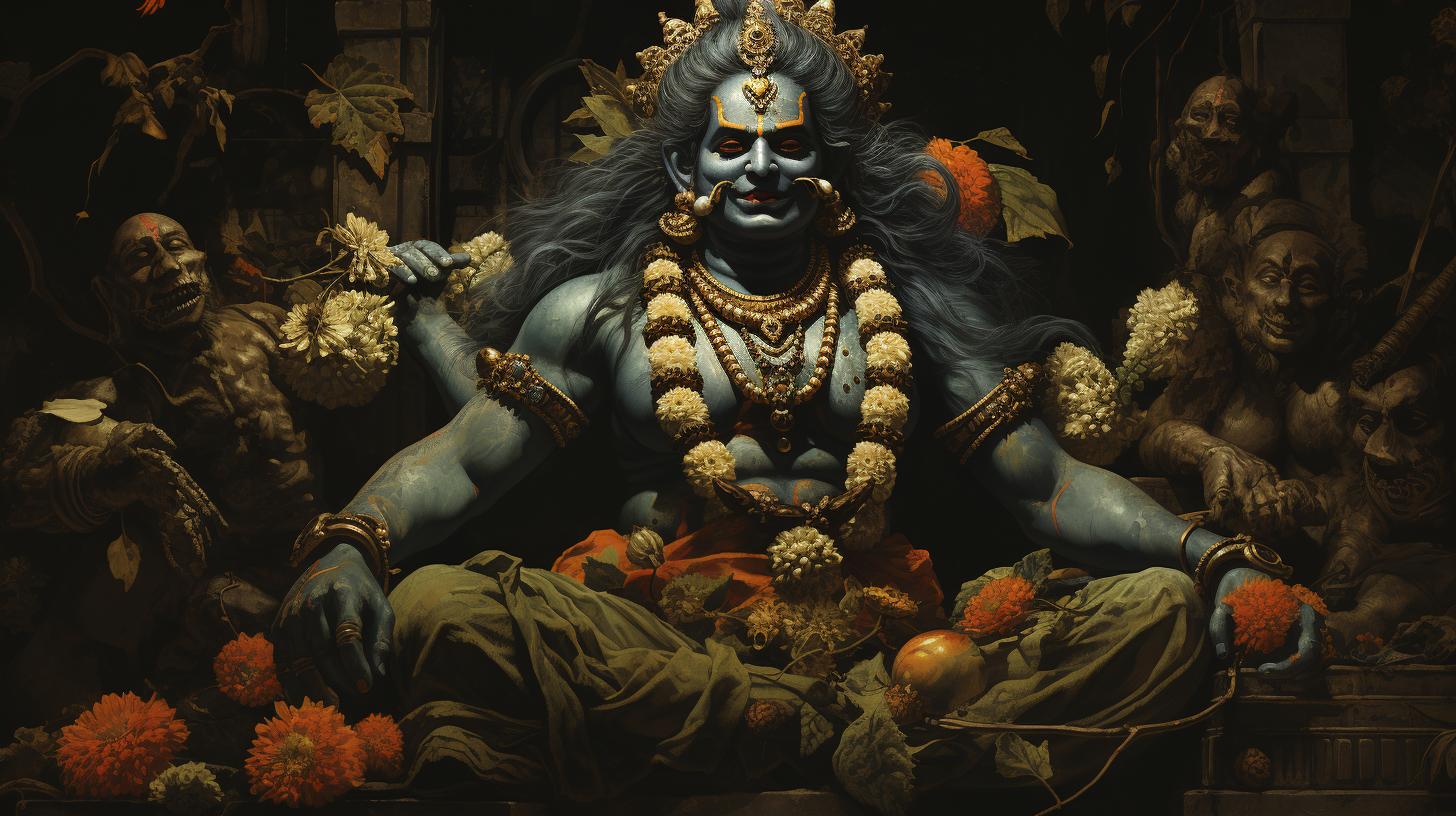Brihaspati: Exploring the Divine Wisdom and Influence of the Hindu God

Brihaspati, the Hindu god, holds great significance in the ancient Vedic religion. As the divine preceptor and wise sage, Brihaspati is revered for his profound wisdom and guidance. Mentioned in the Rigveda and considered the regent of planet Jupiter, he influences various aspects of life.
The worship of Brihaspati takes place in mandirs, where devotees engage in rituals and puja, offering devotional prayers and donations. With his auspicious influence in astrology, Brihaspati’s teachings continue to impact love, career, finances, health, and more.
Let’s delve into the rich traditions and beliefs surrounding this revered deity.
Exploring the Vedic Religion
The Vedic religion is a fascinating ancient tradition that provides insights into the religious practices of the Indo-European people who migrated to India around 1500 BCE. This section delves into various aspects of the Vedic religion, including its origin, the significance of the Vedas, and its influence on modern Hinduism.
Ancient Indo-European Arrival in India
The ancient Indo-European migration to India during the 2nd millennium BCE marked the beginning of the Vedic religion. These ancient Indo-European peoples brought with them their cultural, linguistic, and religious beliefs, which eventually shaped the foundations of the Vedic tradition in India.
Significance of the Vedas in Vedic Religion
The Vedas hold great importance in the Vedic religion. These sacred texts, composed in archaic Sanskrit, are considered the oldest existing scriptures. They contain hymns, rituals, prayers, and philosophical teachings that provide a profound understanding of the spiritual quest and moral codes of the Vedic people.
Influence of Vedic Religion on Modern Hinduism
The Vedic religion played a significant role in the development of modern Hinduism. Many of the concepts, rituals, and practices found in the Vedas became foundational elements of the Hindu faith.
The wisdom and teachings of the Vedic religion continue to shape the religious and cultural landscape of Hinduism today.
Understanding Brihaspati: Mythology and Role
Brihaspati, revered as a divine preceptor and wise sage, holds great significance in the Vedic religion. His role is multifaceted and deeply rooted in ancient texts and mythology. Let’s explore the various aspects of Brihaspati’s mythology and his prominent role:
Brihaspati as a Divine Preceptor and Wise Sage
Brihaspati is known as the divine preceptor, imparting wisdom and guidance to the gods themselves.
As the revered guru of the deities, he possesses profound knowledge of the sacred scriptures and imparts divine teachings to all those who seek enlightenment. Brihaspati’s role as a preceptor showcases his esteemed position in the Hindu pantheon.
Brihaspati in Vedic Literature: Rigveda and Other Texts
The ancient Rigveda, among other Vedic texts, references Brihaspati and showcases his importance in Vedic literature. His hymn in the Rigveda evokes reverence and highlights his divine qualities. As one of the early texts, it reinforces Brihaspati’s position as a revered figure in Vedic mythology.
Brihaspati as the Regent of Planet Jupiter
Astrologically, Brihaspati is believed to be the regent of the planet Jupiter. Being the largest planet in the solar system, Jupiter symbolizes expansion, wisdom, and abundance. Brihaspati’s association with Jupiter makes him the bringer of auspiciousness and prosperity.
His influence extends to various aspects of life, including love, career, finances, health, and more.
Understanding the mythology and role of Brihaspati provides deeper insights into the ancient Vedic traditions and the profound impact this revered deity holds.
His wisdom, teachings, and astrological significance continue to inspire devotees to seek guidance and blessings in their lives.
The Worship of Brihaspati: Rituals and Beliefs
Mandir of Brihaspati: Sacred Temple and Its Events
The Mandir of Brihaspati stands as a revered place of worship, where devotees gather to pay homage to the divine deity. This sacred temple hosts a range of events throughout the year, including festivals, religious ceremonies, and special prayers dedicated to Brihaspati’s wisdom and blessings.
It serves as a spiritual hub for seekers, fostering a sense of community and devotion.
Performing Puja to Brihaspati: Devotional Offerings and Practices
Puja to Brihaspati entails a heartfelt expression of devotion and gratitude towards the benevolent deity. Devotees engage in various traditional practices, such as chanting sacred mantras, lighting incense, offering flowers, and performing arati while invoking the blessings of Brihaspati.
This puja ritual serves as a means of seeking guidance, prosperity, and spiritual growth from the divine guru.
Brihaspati in Astrology: Influence on Various Aspects of Life
In the realm of astrology, Brihaspati holds significant importance as the planet Jupiter, symbolizing wisdom, knowledge, and benevolence. Understanding the astrological significance of Brihaspati and its effects can shed light on various aspects of life.
Astrological Significance of Brihaspati and its Effects
Brihaspati’s presence in one’s birth chart is believed to bring auspiciousness and good fortune. Known as the “Guru” or spiritual guide in astrology, Brihaspati influences our belief systems, moral values, and spiritual growth.
Its favorable positioning in the birth chart is associated with success, abundance, and higher knowledge.
Brihaspati’s Role in Love, Career, Finances, Health, and more
Astrologically, Brihaspati influences various aspects of life, including love, career, finances, and health. Its positioning can have an impact on relationships, bringing harmony and growth. In career matters, Brihaspati is associated with success, leadership, and growth opportunities.
Financially, its favorable positioning may bring wealth and prosperity. Additionally, Brihaspati’s influence extends to health, promoting overall well-being and longevity.
Ordering Prasad and Abhimantrit Products Online
Devotees have the option to order Prasad, sanctified food offered to Brihaspati, and Abhimantrit products online. This allows individuals to partake in the divine blessings and receive the sacred offerings from the Brihaspati Mandir.
Ordering online offers convenience and an opportunity to connect with Brihaspati’s energy even from a distance.
Exploring Brihaspati’s influence in astrology provides insights into its impact on various aspects of life, including love, career, finances, health, and more.
Understanding its astrological significance allows individuals to harness its positive energies and seek guidance for a prosperous and fulfilling life.
Exploring the Richness of Vedic Rituals and Rites
Vedic rituals and rites form an essential part of the ancient Vedic religion, offering a glimpse into the deep-rooted traditions and practices of the time. These rituals were conducted with utmost reverence and held symbolic meaning in various aspects of life.
In this section, we delve into the richness of Vedic rituals and rites, uncovering their significance and understanding their importance in the Vedic period.
The Soma Sacrifice: Prosperity and Well-being
One of the most significant rituals in Vedic practices is the Soma sacrifice.
This ritual involved the offering of Soma, a sacred plant, to the gods, aiming to ensure prosperity and well-being. The Soma sacrifice was thought to establish a connection between the human and divine realms, seeking divine blessings and divine favor.
Participants believed that through this ritual, they could attain abundance, success, and blessings from the deities.
Fire Rituals and their Symbolism in Vedic Practices
Fire had a central role in Vedic rituals, symbolizing purity, transformation, and the eternal connection between the earthly and divine realms. Yajnas, or fire rituals, were performed to invoke the presence and blessings of the gods.
Offerings such as ghee, grains, and sacred herbs were offered into the fire to signify the transmutation of earthly elements into spiritual energy. Fire rituals were believed to purify the atmosphere, ward off negative energies, and create an auspicious environment for spiritual and material growth.
Understanding the Vedic Period and its Ritualistic Traditions
The Vedic period, spanning from around 1500 BCE to 500 BCE, witnessed the development of rich ritualistic traditions that shaped the religious and cultural landscape of ancient India. During this era, rituals were performed meticulously, following precise guidelines laid out in the Vedas.
These rituals were conducted by priests known as Brahmans, who held the knowledge and expertise required to perform the ceremonies. Understanding the Vedic period and its ritualistic traditions helps us gain insights into the beliefs, values, and practices of the ancient Vedic religion.
The Ancient Wisdom of the Vedic Literature
The Vedic literature holds profound insight into the spiritual wisdom of the Vedic religion, offering guidance and enlightenment to its followers. Let’s delve into its key components and their significance.
The Vedas: Sacred Texts of Vedic Religion
The Vedas, considered the most revered scriptures of the Vedic religion, provide a comprehensive understanding of its philosophical and ritualistic aspects.
These ancient texts encompass hymns, prayers, rituals, and profound teachings, offering a glimpse into the rich tapestry of Vedic wisdom.
Rigveda: An Insight into the Oldest Vedic Text
Among the four principal Vedas, the Rigveda stands as the oldest and most important text, composed in archaic Sanskrit. It comprises hymns dedicated to various deities, including Brihaspati, and serves as a source of poetic expressions, spiritual contemplation, and valuable insights into Vedic culture and mythology.
Influence of the Vedas on Hindu Mythology and Deities
The Vedas form the foundation of Hindu religious and mythological beliefs, shaping the understanding of deities, creation, cosmic order, and the eternal quest for knowledge and spiritual realization. They intricately interweave mythology, history, and philosophy, contributing to the vast tapestry of Hindu cosmology and divinity.
Within the ancient wisdom of the Vedic literature lies a treasure trove of knowledge, embracing the sacred nature of existence, the pursuit of truth, and the eternal wisdom expressed through hymns, rituals, and profound teachings.
Examining the Historical Context and Cultural Significance
The historical context and cultural significance surrounding Brihaspati and the Vedic religion provide us with valuable insights into ancient India. This section delves into various aspects that shaped the society and governance during the 5th century BCE.
Vedic Religion and Society in 5th Century BCE
The Vedic religion, with its deep-rooted traditions and rituals, held immense importance in the society of 5th century BCE. It influenced social structures, religious practices, and moral values among the ancient Indo-Aryans.
The Rigveda, as a prominent Vedic text, served as a guiding force in shaping the religious beliefs and customs of the people.
Indo-European Influence and Geography of Ancient India
The Indo-European influence played a crucial role in the development of Indian culture and society. As ancient Indo-European tribes migrated into the Indian subcontinent, they encountered indigenous cultures and integrated their own practices with those of the local populations.
This cultural amalgamation resulted in a diverse and vibrant society with distinct religious practices.
The vast and varied geography of ancient India also influenced the cultural traditions, including the worship and reverence of deities like Brihaspati.
Different regions had their unique customs and rituals associated with their understanding of Vedic traditions, reflecting the rich tapestry of the subcontinent.
The King and the Role of Brihaspati in Governance
In ancient India, kings held significant power and were responsible for upholding the welfare and administration of their kingdoms.
Brihaspati played a crucial role as the divine advisor and counselor to the kings, guiding them in matters of governance, justice, and maintaining harmony within the realm.
Brihaspati’s wisdom and teachings were instrumental in shaping the principles and laws that governed ancient Indian societies.
The king relied on his guidance, ensuring the welfare of the citizens and the righteous functioning of the kingdom.
Key Points:
- The Vedic religion had a profound impact on the society of 5th century BCE, shaping religious beliefs and customs.
- The Indo-European influence influenced Indian culture and resulted in a diverse society with distinct religious practices.
- Brihaspati served as the divine advisor to kings, offering guidance in matters of governance and justice.
Unlocking the Mysteries of Brihaspati’s Influence
Unlocking the Mysteries of Brihaspati’s Influence delves into the profound impact this Hindu deity has on various aspects of life.
From personal well-being to astrology and celestial associations, Brihaspati’s influence is far-reaching.
Determining Brihaspati’s Impact on Personal Life
Brihaspati’s influence extends to personal life, shaping individuals’ beliefs, choices, and overall destiny. Understanding his role and teachings helps unravel the mysteries of how Brihaspati impacts personal growth and spiritual development.
Exploring Brihaspati’s Association with the Sun
Beyond his role as the preceptor of the gods and the regent of Jupiter, Brihaspati also has a significant association with the Sun. This connection sheds light on the intricate relationship between Brihaspati’s wisdom and the life-giving energy of the Sun.
Reviewing the Importance of Brihaspati in Astrological Readings
Brihaspati’s influence is particularly significant in the realm of astrology. Studying his positioning and interactions in astrological charts provides valuable insight into individuals’ lives, impacting key areas such as relationships, careers, and overall destiny.
Brihaspati in Comparison: Similarities and Differences
Contrasting Brihaspati with Other Vedic Deities
When comparing Brihaspati with other Vedic deities, it becomes evident that each deity possesses unique characteristics and roles within the Hindu pantheon. While Brihaspati is revered as the preceptor of gods and the embodiment of wisdom, other deities such as Indra, Agni, and Varuna hold different domains of influence and symbolism.
Indra, known as the king of gods and lord of thunder, signifies power and sovereignty. Agni, the god of fire, represents transformation and is worshipped for his purifying properties.
Varuna, the god of cosmic order and divine law, maintains the moral and ethical balance in the universe.
Despite these differences, Brihaspati shares a common connection with these deities as important figures in Vedic mythology, showcasing the diversity and complexity of the ancient Hindu pantheon.
Analyzing Brihaspati’s Role and Influence in Hinduism
Brihaspati’s role extends beyond being a mere deity. As the preceptor of gods, he holds significant influence in imparting knowledge, wisdom, and guidance. His association with the regent of planet Jupiter further enhances his importance in astrological beliefs and practices.
In Hinduism, Brihaspati is often viewed as a symbol of intellectual prowess and spiritual illumination. His wisdom serves as a guiding light for seekers of knowledge and spiritual seekers, emphasizing the importance of lifelong learning and self-improvement.
Brihaspati’s role in Hinduism highlights the connection between divinity and the pursuit of wisdom, and his teachings continue to shape the beliefs and practices of devotees in the modern era.
Brihaspati and the Ultimate Reality in Vedic Philosophy
In Vedic philosophy, Brihaspati’s significance goes beyond his role as a deity.
He represents the quest for understanding the ultimate reality, the nature of existence, and the cosmic order.
As a wise sage, Brihaspati offers insights into the eternal truths and encourages individuals to explore the deeper meaning of life.
His teachings encompass the concepts of righteousness, cosmic harmony, and the interconnectedness of all beings.
Through Brihaspati’s teachings, devotees are reminded of their spiritual journey and the pursuit of enlightenment, aligning their lives with the profound philosophical principles explored in Vedic philosophy.
- Contrasting Brihaspati with Other Vedic Deities
- Indra, Agni, and Varuna: Different Domains of Influence
- Analyzing Brihaspati’s Role and Influence in Hinduism
- Brihaspati as the Preceptor of Gods
- Brihaspati and the Regent of Planet Jupiter
- Brihaspati’s Teachings in Intellectual and Spiritual Growth
- Brihaspati and the Pursuit of Wisdom in Hinduism
- Brihaspati and the Quest for Ultimate Reality
- Cosmic Harmony and Interconnectedness in Brihaspati’s Philosophy
Brihaspati: A Timeless Symbol of Wisdom and Devotion
Historical, Cultural, and Spiritual Significance
Brihaspati, the Hindu god, holds profound historical, cultural, and spiritual significance. Revered as the preceptor of the gods and the embodiment of divine wisdom, Brihaspati has been worshipped since ancient times.
His teachings and guidance have influenced the Vedic religion and continue to resonate in modern Hinduism. Brihaspati is regarded as a symbol of knowledge, enlightenment, and spiritual growth, embodying the timeless principles of wisdom and devotion.
Impact of Brihaspati’s Teachings on Human Life
The teachings of Brihaspati have a significant impact on human life, transcending the boundaries of time and culture. His wisdom imparts valuable insights into various aspects of human existence, including morality, ethics, and the pursuit of knowledge.
Brihaspati’s teachings inspire individuals to cultivate virtues such as compassion, righteousness, and intellectual curiosity, fostering personal growth and a deeper understanding of the world around them.
- Nurturing intellectual curiosity and the quest for knowledge
- Promoting ethical behavior and moral values
- Inspiring compassion and empathy towards all beings
- Encouraging a deeper understanding of the divine and spiritual realms
Appreciating the Reverence for Brihaspati in Modern Society
In modern society, the reverence for Brihaspati endures, with numerous devotees seeking his blessings and guidance. His teachings continue to inspire people from diverse backgrounds, transcending religious boundaries.
Brihaspati’s influence extends beyond religious practices, resonating with individuals who embrace wisdom, spirituality, and intellectual pursuits. The timeless symbol of Brihaspati serves as a reminder to cherish and uphold the values of wisdom, devotion, and enlightenment in everyday life.




















